Land of Love – Gerhearts Vision
Introduction and motivation
When old people are looking back at their lifes they seldom say „I should have made more money“, „should have had more luxury like bigger houses, cars“ , „I should have spent more time at work“, „watched more TV“, „eaten more fast food or consumed more drugs“. They rather say „I should have spent more quality time with friends and family“, „should have done something useful that makes really sense for mankind and the planet as a whole“, „should have done more things I was really passionate about“, „should have had more courage to step out of unfullfilling routines and experiment on new adventures“, „should have travelled more to see the world“, „should have had a closer connection to god, my inner guides, my intuition“, „should have been more alive and joyful“ and „should have loved more“. These insights are valuable, especially when you have them way before you are about to die, so that you still have time and energy to adopt your life accordingly. In the current transition period of our planet seeking security by holding on to known patterns is an illusion because they are not sustainable and likely to crumble down within our lifetime. So even from a security point of view it is much wiser to develop alternative models now: Lets create the Land of Love together!
Land of Love is a consciously created, earth-based spiritual community and transformational living and learning center inspired by the path of freedom, love and aliveness. We wish to empower people to discover and share their natural gifts in cooperative celebration and service.
All over the world people are waking up. At Land of Love we are responding to this rise in global consciousness that is calling out for a more practical spirituality. This spirituality brings consciousness to the internal human experience and grounds that awareness in the mirror of the physical world.
Our vision is to create a community environment integrating the internal human landscape with the external world. We desire to cultivate conscious personal and interpersonal relationships alongside conscious land development, food production and renewable energy supply. In order to realize the dream of an enlightened way of life, we desire to forge a deeper union between spirituality-based communities and ecology-based communities.
Land of Love is an international community, where people are committed to a shared journey towards a holistic life culture, regardless of cultural/ spiritual backgrounds and age.
We honor the beauty of simply being as well as the path of consciously becoming. Cultivating presence is the key to the path of being and becoming.
Health and Wellbeing
We are committed to conscious earth and body care, honoring the sacredness of the natural world and the body as a temple. We cultivate and eat organic fruits, vegetables and medicinal plants, use natural building techniques, practice yoga, tantra, water dance, ecstatic meditations and share the gift of massage. Many substances, including sugar, coffee, tobacco, alcohol and other substances alter our consciousness and potentially lead to addictive patterns. We choose to use potentially mind altering or addictive substances consciously and on a limited basis, and value maintaining healthy lifestyle patterns. We aim for a common wellbeing with a balance between doing and being.
Community living
Interdependent cooperative living is an essential part of creating a harmonious evolutionary culture. We are committed to cultivating healthy relationship skills through practicing mutual support, vulnerability, honesty, reflective listening, non-violent conflict resolution, consensus process and healthy boundaries. We encourage every one to follow his own unique mental-spiritual-politcal path and support each other to manifest our dreams and visions in accordance with the highest good. We learn and orientate on succesful communities like Tempelhof, Zegg, Tamera, Inanitah, Findhorn, Auroville, Gaia-Oasis and many others. Freedom, love, closeness, understanding and trust grow on a base of connectedness, communication and common actions.
There will be communal living and meeting spaces as well as private retreat areas. We are creative with different kinds of alternative, sustainable housing, such as earth and treehouses, tiny houses, circuswagons, straw and cob constructions, tipis, earthsships, jurts, …
Rituals are important in community life to maintain a feeling of connectedness. We establish creative rituals together that cover verbal, physical, emotional and spiritual aspects. This could be verbal sharing, yoga, dancing, meditating, celebrating, cuddling, appreciate the positive of each day. The higher the percentage of the community members attending these activities the more the connectedness is cultivated. At least one or two of these rituals per week should be mandatory for all.
No guru! – all leader principle
After being accepted as a full member, everybody in the land of love has equal rights and duties. Everybody brings in his full potential, steps into leadership and power, so that we meet and teach each other on the same level. Each individual and the group follow the inner guru as opposed to have one human guru the community is following. Information is available to everybody and decision-making is a well structured and transparent community process based on consensus. (see details at the end of the text)
Communication
We seek deep connection through authentic, nonviolant communication and transparency based on a high level of individual and group consciousness. We treat each other with an open heart and communicate with truth, integrity and in a non violent way. We decide to be really in true contact with ourselves and others. We are aiming for a culture where mutual connection and understanding can grow beyond fears and prejudices.
Practical: Transparency circle, forum, council-sharing at least once a week. Tuning into each other by verbal sharing, physical and emotional sharing, and spiritual sharing by community meditations.
Attitude and assumptions of nonviolant communication:
– Humans are willing to cooperate, when they can trust to be seen and accepted with their own issues
– Needs are the motivation of any human behaviour. Any behaviour serves to meet needs.
– Any form of criticism, attack, reproach, etc.. is the expression of unfullfilled needs
– Every human being has remarkable resources and talents, which can be seen and experienced, when we approach them with empathy.
– There is no such thing like hierarchy in human relations as all are equal.
– Everyone it doing the best he can do, anytime.
Love, Sex and Relationships
Relationships come in all shapes and sizes. We recognize sexuality as an integral aspect of human relationships and advocate it’s conscious expression while valuing individual boundaries. We honor the opportunity that relationships offer for self-reflection, growth and co-creation. This includes relationship to yourself, to your beloved partner (or your polyamorous network) and to the community as a whole.
Land of Love is dedicated to a violence free lifeconcept for humans and nature. A special focus within this is the healing of love and community interactions. Love, sex, marriage and relationships shall be liberated from mistrust, rules, lies and fears. Thus peace may prevail, when we set love free and live it liberally in whatever form it might take. Transparency and open sharing are considered essential especially in this area. We are aware that many conflicts, violence, frustration, depression have their origin in an unfullfilled love- and sex-life. Creating a safe and trustful environment in which love and sexuality can be expressed naturally is the base to create peace between women and men. Not repressing this key life-force brings us into our full potential, supports creativity and heals past wounds or traumas.
Rather than focussing on „how do I look like“ the awareness should be invited to shift deeper, below the surface.
Voluntary Simplicity and reduction of consuming
We value and encourage voluntary simplicity. We recognize that in consciously choosing a more simple way of life we create a more harmonious existence with the earth and with each other.
We are aware that the resources of the planet are limited. We exchange our thoughts and inspirations of how to reduce our consumption and put into to action according to what is feasible for us. We voluntarily limit our possibilities to consume to create awareness that not everything is available unlimited all the time. E.g. off-the-grid renewable energy solutions have the consequence, that on cloudy days with little wind, electric energy is restricted, especially at night. Charging devices only during daylight hours, when there is abundant solar power. Taking warm showers when heat is available (solar, compost-heat) rather than using gas or wood. Repairing rather than throwing away and buying something new. Shared use of goods, rather than individual possessions for individual use. Buy second hand products if „new“ stuff is needed. Prefer local and seasonal food from highly processed food and/or food that has travelled large distances, or has been kept fresh for months. We generally live a vegetarian mind-altering-substances free lifestyle, although conscious individual exceptions are tolerated. We only buy food in quantities, that nothing has to be disposed. We voluntarily step out of addictive patterns of any kind and support each other in the process.
We recycle as much as possible (multiple use of water, composting organic material which includes the use of compost toilettes, using „rubbish“ for building houses (earthship-principle).
Reduce, reuse, recycle!
Facilities and location:
Aiming for self sufficiency the ground must be big and fertile enough to grow most of the food needed within the community.
Initial investment should not exceed 20000 EUR per person for buying the property plus about the same amount for building or renovating houses. The aim should be not to need money from banks so that resources are not wasted to pay external interest rates. However initial money can be lend from financially more potent inhabitants to those who could otherwise not afford it.
This means – considering our budget – that we are looking for a land a good distance away from urban centers, with little developed infrastructure, low local economy and little possibilities for external jobs….and close to nature, away from the noise and speed of industrial, consuming, materialistic lifestyle.
The ground itself should have sufficient fresh water supply, preferably from our own source. Ideally there is access to a river, a lake or the ocean. Trees or even a forest should be part of the property as well as enough space for building housing (and the legal rights to build!), having a garden and agricultural space for food production (permaculture) and animals.
The land should be in a country whose legal structures allow us to settle down without needing to renew visas, the permanent right to buy and own land and the right to work and own money. Political structures should be stable enough to secure a longterm investment and home.
The living area should provide the following facilities:
Houses for communal living, which could at the first step include tents, tipis, simple huts, mobile wagons (circus- or construction-trailers, RVs) or using existing buildings (if any available). Housing should reflect the individual needs for solitary retreat, couple space or larger-sub-housing-communities.
At a later stage more permanent and sustainable houses could be built newly, following ecological principles such as earthhouse, earthships, straw or cob-constructions. Even though different types of structures are welcome the community aim is to achieve an esthetic harmony, melting together with the natural environment.
Communal gathering spaces should include an outside fire place and a big multipurpose building. There should be a kitchen to prepare food for the whole community, an indoor and outdoor eating area, an indoor seminar and gathering hall.
Once these essentials are provided for (sleep, eat, gather) other specially dedicated areas will be established: Yoga and meditation temple, music, cuddling and massage (ideally in front of an indoor fireplace), guesthouse, kids and play-area (indoor and outdoor), sweatlodge, warmwater-watsu-pool, shop (to sell and exchange goods, including the excess of own food production), machine- and tool rooms for working and repairing, shared office spaces. Rooms for community and individual businesses. There should be clothing-optional areas.
Fast internet connection.
Sharing
We value the sharing of resources and engage in an economic and knowledge based cycle of giving and receiving among each other and within the local community (neighbours, village, region)
Work and Economy
Land of Love is aiming towards an increasing level of both ecological and technological self-sufficiency, which includes letting go of old structures and discover new ways. This means a maximum of regional energy and food-autarchy.
The legal structure of the community assures that no individual person owns land or infrastructure, but always the community as a whole. Like this it is assured that the project or parts of the projects cannot be subjects of speculation. Even if somebody builds his house on the community ground it is not his private property, he has just the right to use it, while living in the community. Should a person leave the community the house, ground, infrastructure stays within the community. However a financial compensation, based on the original investment of the member is paid. However it may be necessary to keep a certain amount of money in the community, which is not returned in case of someone going away. (legal structure to be defined, in accordance of local laws of the region).
All members invest equal shares. Should for some reasons some people invest more, they dont have more influence on decisions. One person = one vote.
Basic needs, such as food, water, electricity, heat, internet, phone, washing and cleaning-products are subject to a shared economy. This means that these costs are equally divided among all inhabitants. Luxury needs and products of personal lifestyle and consumption are covered by everybody on his own account.
There will be an increasingly percentage of community owned business which contributes to self-suffiency and creates an income to cover the cost of the basic needs which need to be purchased from outside of the community. The aim is that jobs outside of the community which will be needed at the beginning can be reduced as internal economy increases. Working hours to run the internal businesses and communal tasks are distributed equally among the inhabitants. Working together is an essential part of community life and can not be replaced by money. To be discussed: Temporary community support in case of illness, parentship or caretaking for old or disabled family members.
Working hours in different fields should be valued equally, no matter if performed in daily life tasks, projects, businesses, indoors/ outdoores, with head or hands. For each main working segment there should be one responsable person in charge who makes a longterm commitment for at least 6 months to build up knowledge and experience. After this period inhabitants are encouraged to take responsibilities in a different area to develop a good practical understanding of the whole project. Apart from the responsable persons in charge, the inhabitants contribute their work in different areas. E.g. it makes sense that one person is responsible for the garden for a longer period of time, but everybody can work in the garden a couple of hours a month, managed by the person in charge.
Activities:
seminars, events, yoga, massages, art, agriculture, permaculture, veggie-garden, sheep, chickens, forest/wood, fruits, music, graphic-design, webhosting, marketing, etc..
New members
Many people have romantic dreams about communities, but if it really comes to make the big step to join one, a few dare to do so. Moving away from friends and family, quitting your job, say good bye to routines and security thinking , investing a considerable amount of money and setting sails to an adventure in an unknown territory might be scary in the first place. Similar to stepping into a relationship it is much better, if you do not need the community to live your life. An independent and creative personality who has a lot to share is needed especially for the startup phase of a new community. You can read in this book, why 90 % of all community founding projects fail and what it takes to make it succesful.
Even the clearest vision may lead to some misunderstandings about what it really means in daily life. Sustainable, ecological and social-responsible are keywords most of us would identify with. But how far would you go, personally? These same keywords may mean completely different things if you put them into practical life.
That is why it is so important that the initial founding group really works out a precise and clear down to earth vision of what the project is about. Like this it can attract the right people who identify with the vision and are capable and enthusiastic to make it a success.
Another trap is to set unrealistic goals, especially financially. Dreaming about a big property at Starnberger See just outside of Munich, where the millionaires are living, is simply not realistic. You will not pay less than 2000 EUR/m2 and will need at least 10000 m2 if you want to grow most of your food and provide living space for a whole community. This sums up to 20 million EUR just for the property!
Lets assume a bunch of people made it. We are on the same boat, are enthusiastic and full of energy and love for our project, found and bought the right property and are ready to invite new members in. At that stage it is essential to get to know the new potential members well enough, before making the decision to accept them as full members. Spending time visiting, attending workshops, getting to know the community should be the first steps. If the community agrees the next step would be a period of about 6 months as a working guest. After this new member can apply to be full members, if they fit into the community and also fulfill the financial requirements. This decision is taken by consensus by the existing community. After this the new member is fully integrated with full duties and rights, including taking part in the decision making.
The future outlook
Our vision for the future of Land of Love is the ongoing development of a residential and international community, hosting a space for healing and learning workshops surrounded by an abundance of homegrown organic food. Apart from workshop guests the exchange with the international community-network will be carried out by temporarily hosting residents from partner communities. As part of a semi-nomadic lifestyle Land of Love residents will likewise be given the opportunity to live in partner communities as part of an exchange program not based on money. To maintain a healthy continuity and conservation of knowledge at least 2/3 of the people at site should be longterm residents.
Agreements
Out beyond ideas of right doing and wrong doing, there is a field. I will meet you there. –Rumi
Be present: My intent is to live alive and free, to be myself, to be authentic, and to be fully present.
Realize my potential: My commitment is to realize my full potential and support others in doing the same.
Follow my guidance: I agree to attune with spirit and follow the calling of my soul on behalf of the wellbeing of the whole.
Intention for the highest good: I acknowledge and honor my primary intention for the Highest Good – concerning the Earth, all my relations, and myself. I recognize that I may never know for certain what the “answers” are, but my intention is to learn from my experience and to move in the direction of the highest good for the whole.
Service to others: I am willing to open my heart, still my mind and be in compassionate service to all life.
Stay awake: When I find myself going into reactivity I agree to become present and awake with my experience, and to explore feeling inward instead of leaning out, unconsciously defending myself for projecting onto others.
Communicate with integrity: I agree to be honest and compassionate with my communications – to speak from my heart, maintain connection, and to be true to my word.
Act with integrity and humility: I agree to keep my agreements, to follow my heart in making commitments, to negotiate changes if I need to, and to ask for help when I need it.
Listen deeply: I agree to listen respectfully to the communication of others and tune into their deepest meaning, noticing any inner reactions and taking responsibility for my feelings while staying present to truly listen.
Honor one another: I agree to come from a sense of cooperation and caring in my interactions with others, respecting that our objectives are often the same, although our positions and methods may differ. I recognize that everyone is a unique expression of the divine, and I honor the intelligence of body, mind, and emotions as uniquely expressed through each of us.
Appreciate our contributions:I agree to take responsibility for asking for and receiving acknowledgement and for acknowledging others.
Take responsibility: I agree to take responsibility for my creations, my reactions, my experience and my relationships. Therefore, I recognize there is no one to blame, nothing to defend, only wisdom and compassion to embody.
Maintain resonance: I agree to take the time to establish rapport and re-connect with anyone with whom I feel out of harmony as soon as it is possible.
Resolve concerns constructively: I agree to offer at least one solution any time I present a concern. I agree to take concerns, complaints and upsets to the person(s) with whom I can resolve them, at the earliest opportunity. I agree not to criticize or complain to someone who cannot do something about my complaint, and I will redirect others to do the same. I will always assume that others follow their needs and do not act to harm me on purpose. If a solution cannot be found in the first place I am willing to look deeper what my needs truly are and offer alternative strategies to meet these needs – and I will help others to do the same.
Collaborate and lead: I agree to foster an environment of genuine collaboration in which all people, including myself, feel empowered to express our individual and collective potential.
Come from my resources: I agree to take care of myself and to honor my own sense of balance with conscious choice in areas like sleep, nutrition, exercise, and thinking, so that I may live from a place of resource.
Keep my commitment fresh:I agree to choose and re-choose to participate in this community. It is my choice. I recognize my responsibility to contribute what is alive and true in my heart today.
Lighten up: While honoring all these agreements and taking them seriously, I aspire to do so with an attitude of lightheartedness, recognizing that joy is the natural by-product of living my authentic self.
Love and compassion: I agree to treat others and myself with love, compassion, encouragement and patience when we struggle with these intentions. I recognize the perfection of the imperfection in each of us.
Totality: I am committed to being Total—to do my best to be complete with each day—to live as though today is my first and my last day alive. I agree to live this moment to the best and fullest of my capacity.
Decisionmaking
Conscious or unconscious decisions are taken by all of us almost every minute. Not everything needs to be brought to the community meetings, but decisions should rather be taken on the lowest possible level, always including all persons involved by the consequences of the decisions. In a culture of trust and transparency many decisions can be taken by those in charge of the specific resort and if necessary in coordination with relevant other resorts, e.g. the question what is served for lunch the next day is decided by the kitchen team – if necessary in coordination with the garden team. Major decisions like investments above a defined limit, accepting or declining new members, exceptions from previously agreed rules or general ethical or strategic issues need to be discussed in regular meetings, which are mandatory for all community members.
Regular meetings are held once a week. In emergencies even adhoc.
To avoid endless, frustrating discussions or even arguments the following guidelines have proven to work well:
1. Preparation
As soon as a topic arises for someone, he should clarify for himself (this helps also to deal with the stirred emotions until the topic can be solved):
– what exactly is my concern? Look as deep into it as possible as the real concern is often not the issue that appears in the first place
– Which emotions do I have/ are evoked within me at this topic?
– Which needs are unfullfilled?
– What am I asking others to do in relation to the conflict?
Investigating these questions should put you into a position of addressing the topic without blaming others. Checking in and sharing the outcome with a neutral person might help gaining inner clarity.
Afer doing this step it might be possible to solve issue already directly with the person(s) involved. If not: Write down the topic which you want to have discussed in the next meeting on the community whiteboard, in neutral wording (without exclamations of disagreement!)
2. Opening of the meeting
Before going into the discussion of the topic a short meditation is held asking for solutions in accordance to the highest good of all parties involved. Holding hands, taking a few deep breaths together, looking into everybodys eyes or something similar to create a feeling of connection. After that a flashlight about how everybody feels at the moment is added to create transparency and understanding.
Agree on a time limit for the meeting.
3. Priorize the topics to be addressed
Every person who wrote down a topic gives a brief explanation why he wants to have it addressed, expressing emotions, needs and what he is asking other to do. If a timeline exists until which the decision must be taken before it decides itself by doing nothing, it should be stated.
Mere organisational issues or anouncements with no emotional load, which can be solved quickly are addressed first.
Topics with the highest emotional load come next, followed by topics with the highest common interest.
Aims:
Find solutions which are acceptable for all (compromise), ideally with which everyone is satisfied (consensus)
Orientation towards the needs of all who are involved and avoid blaming (increases the chances to find a consensus)
4. Clarify the method with which a topic is addressed
Council
Nonviolent communication
Fishbowl
Open discussion (only for noncritical, organisational issues)
…..
If desired a neutral person can moderate the topic
The outcome is either a clear agreement (who does what, until when (if the time frame is important)) or the postulation of alternatives that need to be decided upon in a consensus process. Do not forget to agree on how long a decision should be valid until being brought up again. Unlimited timeframe decisions save meeting time but it may be harder to find a consensus.
The aim in formulating the alternative is not to find maximum support for my ideas, but to tune in the group spirit, meditate on the higher good for all beings involved and then make the proposal. The „winner“ is not the one who gathers most votes for his proposal, but the one who proposes an alternative with the highest group identification and the less overall resistance.
5. Consensus process
There are 6 levels of agreement/ disagreement:
1 I agree fully
2 Slight concerns (I agree, but I have slight concerns)
3 Major concerns (I support the decision, but I have major concerns. In these cases it might prove helpful to define a trial timeline for the decision)
4 Standing aside (I neither support the decision, nor am I blocking it. But I am not taking part in putting it to action. Depending on the kind of topic we decide beforehand if this option is available)
5 Neutral (I leave the decision to you, but I am taking part in putting it to action)
6 Veto (The proposal generally opposes my needs and desires. It must not be put into action!)
To avoid mutual influence everybody shows his number at the same time (handsigns with amount of fingers up – Veto = fist)
People who have not voted „1“ should be given the opportunity to express their reasons and be asked what would need to be changed that they could agree fully. Sometimes the consensus process needs to repeated 2 or 3 times to get best results. In a tough phase of the process it can be good to take a short break (fresh air, communal meditation for the highest good).
What to do in case of a veto? Two possibilities:
a) End the discussion, no decision, keep status quo (consider what would be the consequences?)
b) Analyze reasons for the veto, develop new solutions (what is important to whom and why?)
Before bringing a topic to a decision we make clear, if we apply possibility a (e.g. accepting a new community member) of if we keep on looking for a consensus (b). If the discussions beforehand where sufficient, it should be possible to avoid vetos.
6. Celebrate and close the meeting
If the set timeframe for the meeting is over and not all topics could be solved it should be agreed if some extra time is taken (define exactly how much) or if the open topics can be postponed to the next meeting. The awareness of a limited timeframe can keep concentration and efficiency high. Avoid open end discussions!!! Accept that some decisions take time to ripen and still need individual reflections, face to face/heart to heart-communications between the meetings!
Closing the meeting by honouring the results and the clarity, connect again within the circle and end with some creative play (toning together, massage circle, group hug, howling like wolfes, laughter, ..
by Ger-heart with no comments yet.

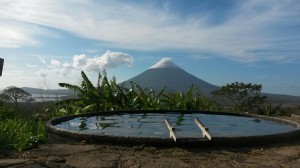
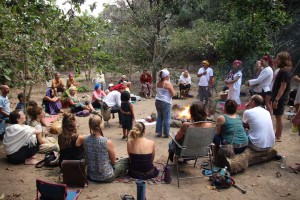
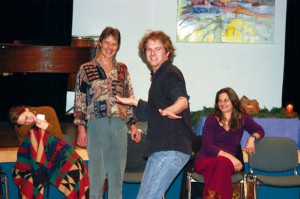
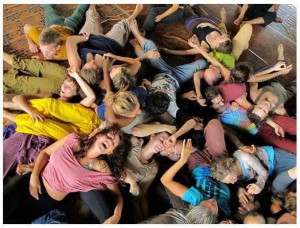
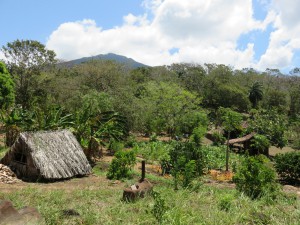
Schreibe einen Kommentar
Du musst angemeldet sein, um einen Kommentar abzugeben.